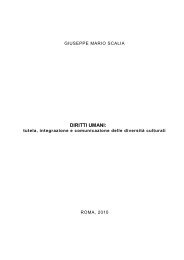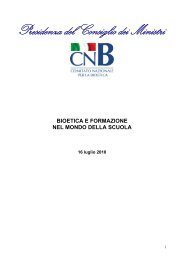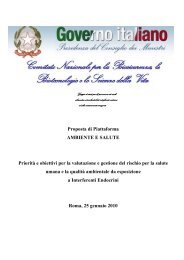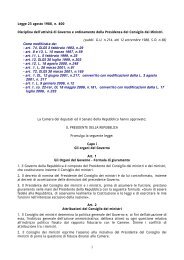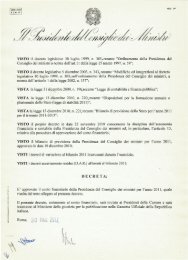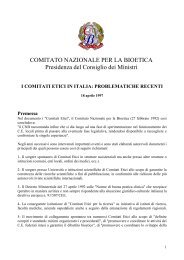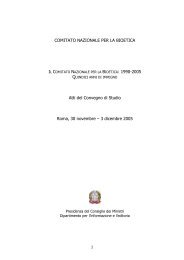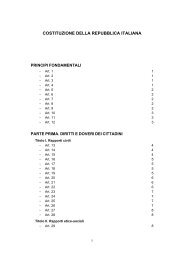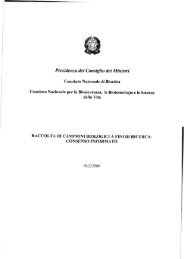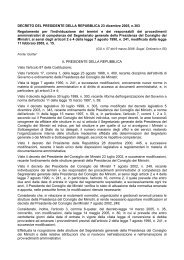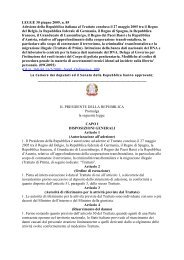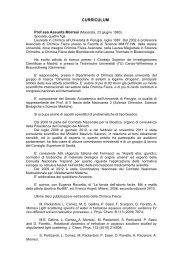President
President
President
You also want an ePaper? Increase the reach of your titles
YUMPU automatically turns print PDFs into web optimized ePapers that Google loves.
INTRODUCTION<br />
The news circulated by the newspapers of three people prepared to donate<br />
their kidney to medical establishments and for the benefit of strangers (so-called<br />
Samaritan donors), and the consequent discussion started in the newspapers,<br />
attracted the attention of the Presidency of the Council of Ministers, which asked<br />
our Committee to express an opinion with regards to the criticality of this new<br />
situation, eventually updating a previous opinion by the NBC, The bioethical<br />
problem of the kidney transplant from a non-blood related living donor (1997),<br />
where kidney donation from a living donor was subordinated to premises of<br />
consanguinity or emotional relations between donor and recipient.<br />
The specificity of the problem is in the fact that in this case donor and<br />
recipient do not have any family or emotional bond, they do not know each other<br />
and the gratuitous organ donation is carried out, as by law, through Organ<br />
Transplant Centres, University Institutes, Hospitals believed to be suitable also for<br />
scientific research.<br />
In giving their answer, the large majority of the NBC felt that Samaritan<br />
donation is legitimate, as it is a supererogatory act, and as such ethically<br />
significant for the solidarity motivations inspiring it and it does not involve higher<br />
risks, from a medical point of view, for the living donor, than those that can be<br />
found in other forms of ex vivo kidney removal (donation between blood relatives<br />
or “emotionally related”).<br />
The NBC however recalled that the supererogatory act cannot be demanded<br />
morally, and even less legally, and it felt that towards this kind of transplant we<br />
must have the same precautions recommended and discussed in the previously<br />
mentioned ’97 opinion.<br />
Given the specificity of the Samaritan donation, the NBC has however<br />
highlighted how this must not substitute (unless there are biological priorities of<br />
compatibility) transplants from blood related or emotionally related living donors or<br />
transplants from cadavers.<br />
It also recommended that this form of donation is exercised respecting the<br />
mutual anonymity of the donor and the recipient and that the information given to<br />
the donor by the medical establishment to inform his/her consent is complete and<br />
exhaustive with regards to the physical or psychological risks involved in this act.<br />
The Committee also requests that the assessment of the donor’s clinical<br />
condition and of the reasons for his/her act is carried out by a “third party”, different<br />
from the medical organisation that will carry out the removal and then the<br />
transplant, and that a register, confidential and respectful of privacy, with the<br />
names of the potential as well as the effective donors, is created.<br />
Finally, it was suggested that, with a similar treatment also for the other<br />
kidney donations from a living donor, this act of generosity is taken into<br />
consideration, in order to translate it into a criteria of preference in the waiting lists,<br />
should the donor him/herself need a kidney.<br />
This text was drawn up by the Committee’s vice-president, Prof. Lorenzo<br />
d’Avack, with the written contribution of some Committee members (and in<br />
particular by Prof. Salvatore Amato, Prof. Adriano Bompiani, Prof. Roberto<br />
Colombo, Prof. Antonio Da Re, Prof. Marianna Gensabella, Prof. Assunta Morresi,<br />
124



